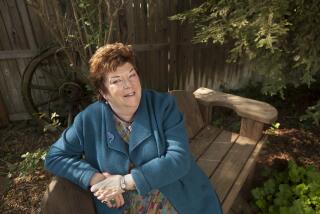Remembrance : The Frailest Giver of Strength
- Share via
It was just two lines in a long listing of obituaries, just her name and the name of the funeral director. For those of us who knew Geri Esten, the entire newspaper wouldn’t have been enough to do her justice.
Geri died of pneumonia on Jan. 27. She was 48 years old and had lived with multiple sclerosis since she was a teen-ager. By the time I met her around 1981, she had lost the use of her arms and legs, was legally blind and spoke so softly that she used an amplifier and even a computer-simulated voice to express herself. Geri lived in her own home, helped by her attendant, Enrique, who-along with his wife and children-became part of Geri’s family.
Geri was a licensed marriage and family therapist and one of the founders of the peer counseling/support group program offered by The National Multiple Sclerosis Society’s Southern California chapter. She not only provided support to others with MS directly, she also trained many of us as counselors. We sometimes describe ourselves as “Geri’s Kids.”)
When I first learned that Geri had died, I felt a kind of detached sadness. I hadn’t seen or talked to her in about a year. While I regretted her passing, it didn’t affect my day-to-day activities, despite the fact that I have MS myself and now work as a consultant to the California chapters of the MS Society.
Later, I began to remember. I remembered the first time I saw Geri--thin and frail-looking, strapped into her wheelchair, entering the room where I was to begin training as an MS peer counselor. She was wearing a green T-shirt that read, “ex-wimp.”
We talked a little about the image she had even then as a “super-crip”--an image she hated. She knew that seeing her could frighten someone with MS, a puzzling and often-disabling disease of the central nervous system that is rarely fatal but whose course is difficult if not impossible to predict. She confronted the issue head-on, urging us to talk about it.
I think what I remember most about the training is the day I had to explore some painful relationships in my family. (Counselors have to deal with their own emotional baggage before they can be capable of helping other people.) There were about 10 of us and it was my turn. Geri encouraged me to talk things through, to confront feelings that I previously had avoided, to express my fears, my anger, my regrets. When I was finished, she said, “That was rough. You’re a very strong person to have done what you just did.”
I was stunned. I had always considered myself weak. Nobody had ever suggested that I might be strong. Geri urged me to try doing something I was afraid to do. Today, I find myself doing a number of things that would have terrified me that day.
Two days after Geri died, a local television news program announced that Dr. Jack Kevorkian had “helped” a Michigan woman in her 40s to commit suicide. Like several other Kevorkian “patients,” the woman had MS.
The report made me angry. Once again, Kevorkian was carrying the message that living with MS is worse than death. I know better. I know that while it sometimes is difficult, life with MS can be full and meaningful.
I worked with Geri in cases involving suicidal clients. In fact, Geri told me that at one time she wanted to commit suicide herself. What if Dr. Kevorkian had been around then? What if she had asked for his brand of “help”?
Geri disliked the super-crip image, and for good reason. She wasn’t a superhero. She was a flesh-and blood human being with a strong will, a compassionate heart and a wicked sense of humor. She was also a rode model.
Geri used to say that when you have MS you form a partnership with it, and you have to remember that you’re the senior partner. Geri Esten remained the senior partner right up until the end. I will miss her.


